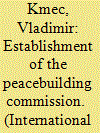| Srl | Item |
| 1 |
ID:
151534


|
|
|
|
|
| Summary/Abstract |
This paper explores the changing distribution of international power by taking the example of the establishment of the United Nations Peacebuilding Commission (PBC). The paper points to tensions between the UN Security Council and the UN General Assembly over the responsibility for the PBC and in the composition of the Commission’s Organizational Committee. These tensions portray the reality of the current international system that is characterized by a shift in the geopolitical power distribution. It is a shift from a system in which the Security Council, strongly marked by the veto power of the permanent members, is responsible for the maintenance of international peace and security to a multilateral one that reflects an increased involvement of non-permanent members in the governance of international peace and security. The Commission marks a transformation of the UN from a system in which power of a state is understood in military terms to one that recognizes the growing importance of other aspects such as economic influence and geographical representation.
|
|
|
|
|
|
|
|
|
|
|
|
|
|
|
|
| 2 |
ID:
113104


|
|
|
|
|
| Publication |
2012.
|
| Summary/Abstract |
This article explores the relationship between the concept of 'organized hypocrisy' and institutional reform in UN peacekeeping. It first demonstrates how the organized hypocrisy in exit strategies arose from the discrepancy between rhetoric, peacekeeping mandates and actions in the field. The analysis then shows how, as a response to organized hypocrisy, peacebuilding replaced the election-based approach of exit strategies from the early 1990s. By evaluating the institutionalization of peacebuilding, the study reveals the hypocritical potential of reform; complex mission mandates, as well as the Peacebuilding Commission, exhibit elements of counter-coupled organized hypocrisy and meta-hypocrisy that remain unresolved.
|
|
|
|
|
|
|
|
|
|
|
|
|
|
|
|
| 3 |
ID:
077706


|
|
|
| 4 |
ID:
076922


|
|
|
|
|
| Publication |
2007.
|
| Summary/Abstract |
There is a danger that the Rule of Law Assistance Unit of the United Nations Peacebuilding Commission will employ the same dominant but problematic paradigm that the international development community has pursued across the globe. This top-down, state-centred paradigm, sometimes known as 'rule of law orthodoxy', stands in contrast to an alternative set of strategies: legal empowerment. Legal empowerment involves the use of legal services, legal capacity-building and legal reform by and for disadvantaged populations, often in combination with other development activities, to increase their freedom, improve governance and alleviate poverty. It is typically carried out by domestic and international non-governmental organisations (NGOs), but also by governments and official aid agencies. This alternative approach focuses directly on the disadvantaged and integration with other development activities, which means it often operates under the de facto rubric of social development. Legal empowerment strategies vary among countries and NGOs. But their impact includes reforming gender-biased, non-state justice systems in Bangladesh; ameliorating the legal system's corruption in post-conflict Sierra Leone; keeping the human rights flame burning in post-conflict Cambodia; advancing natural resources protection and indigenous peoples' rights in Ecuador; and strengthening agrarian reform in the Philippines. Addressing such priorities can help alleviate poverty, ameliorate conflict and prevent chaos or repression from dominating the disadvantaged, particularly in conflict or post-conflict societies.
|
|
|
|
|
|
|
|
|
|
|
|
|
|
|
|
| 5 |
ID:
077704


|
|
|
| 6 |
ID:
077705


|
|
|